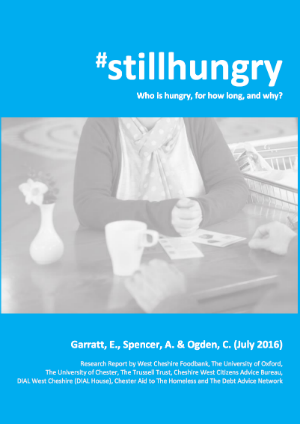New foodbank findings revealed
One of the most comprehensive studies into foodbank use has been published, revealing their rising use and the main causes of food poverty
 Foodbank use is rising, one in three foodbank users are children, and problems with benefits play a major role in people needing to access them - these were among the key findings of the #stillhungry report, released at the end of July.
Foodbank use is rising, one in three foodbank users are children, and problems with benefits play a major role in people needing to access them - these were among the key findings of the #stillhungry report, released at the end of July.
The report was published by the universities of Oxford and Chester, and frontline charities including The Trussell Trust and Cheshire West Citizens Advice Bureau. It drew on two years’ worth of data from 5,808 household referrals to West Cheshire Foodbank, part of the UK-wide Trussell Trust foodbank network.
'Our research demonstrates the persistence of hunger in 21st century Britain,' said Dr Elisabeth Garratt, report author and postdoctoral research fellow at the Centre for Social Investigation, based at Nuffield College, Oxford University.
'Referrals have risen in 2016 and there is every indication that foodbanks are here to stay. One in three people receiving emergency food from West Cheshire Foodbank is a child, indicating shocking levels of poverty that are unacceptable in a country as wealthy as ours.
'Despite enormous commitment on the part of volunteers, the provision of emergency food cannot address the underlying and long-term causes of food poverty. We call upon the Government to take effective steps to ensure that foodbanks do not become an established part of our society.'
The report outlined several reasons why people are using foodbanks:
-
Benefit sanctions: seven per cent of referrals, one in five of those affected being a child.
-
Benefit changes: 14 per cent of referrals, because of stopped or reduced benefits or changes between Jobseeker’s Allowance (JSA) and Employment and Support Allowance (ESA). This was normally the reason for younger adults (17-24) and working-age adults (25-64) being referred.
-
Benefit delays, mainly from JSA and ESA also affected people.
-
One in five referrals was caused by low income.
-
Debt was the cause of 16 per cent of referrals, often due to repayment meaning people were without enough money to live on. Older people were more likely to come because of debt or low income.
The length of crisis varied, lasting anything from one to four weeks with benefit changes to more than 13 weeks with benefit sanctions.
Although a large proportion of the food parcels went to the highly disadvantaged wards, food parcels were delivered to people living in all 46 wards. Children made up one-third of those receiving help from West Cheshire Foodbank.
Young adults and those of working age were most likely to be referred to foodbank due to problems with benefits, while people aged 65 and over needed emergency food because of debt and low income.
'In a prosperous country, it is completely unacceptable that national policy consistently fails to respond effectively to the evidence that on-going hunger remains a reality for increasing numbers of people,' said the Revd Christine Jones, Chair of Trustees at West Cheshire Foodbank.
She added that, in order to avoid foodbanks becoming part of “welfare furniture” we should “all understand and act on the drivers of food poverty together.”
The report offers suggestions for ways in which change can happen. Its recommendations include improving Job Centre Plus administration and service to make it quicker more accessible, reforming benefit sanctions policy and practice, introducing safeguards to ensure families have enough money for essentials, and improving access and awareness of local welfare assistance schemes.
David McAuley, CEO at The Trussell Trust said, 'The work of The Trussell Trust’s foodbank network and sustained commitment from its volunteers has provided much-needed support for people in crisis; yet this alone will not solve the problem of hunger. Charities can be part of the solution but they cannot be the sole solution.
'We are at a pivotal point in British politics post the EU referendum, with a new Prime Minister who has an opportunity to make social justice the centrepiece of what they do. Now more than ever we must work together to ensure fewer families face poverty. There’s an opportunity for all of us to look at the body of evidence in the report, particularly on sanctions, where an alternative approach would help tackle the underlying causes of hunger.'
In response to the report, a government spokesperson said, 'Reasons for food bank use are complex so it is misleading to link them to any one thing. We’re determined to create a Britain that works for everyone, not just the privileged few and that’s why we’re increasing the new National Living Wage and spending around £90bn on working age benefits to ensure a strong safety net for those who need it most. The vast majority of benefits are processed on time and the number of sanctions have actually gone down.'
On benefit sanctions, the spokesman pointed out:
-
Decisions on sanctions aren’t taken lightly but are an important part of our benefits system — they are only ever used as a last resort and the number of sanctions continues to fall.
-
Even when someone is sanctioned they can still get financial support through hardship payments.
-
Sanctions are only imposed in a small percentage of cases. Each month on average less than five per cent of JSA claimants and less than 1 per cent of ESA claimants were sanctioned in the past year.
-
If someone disagrees with a decision to sanction them, they can ask for a reconsideration or appeal to an independent tribunal.
Report compiled by Kira Taylor
Baptist Times, 21/07/2016